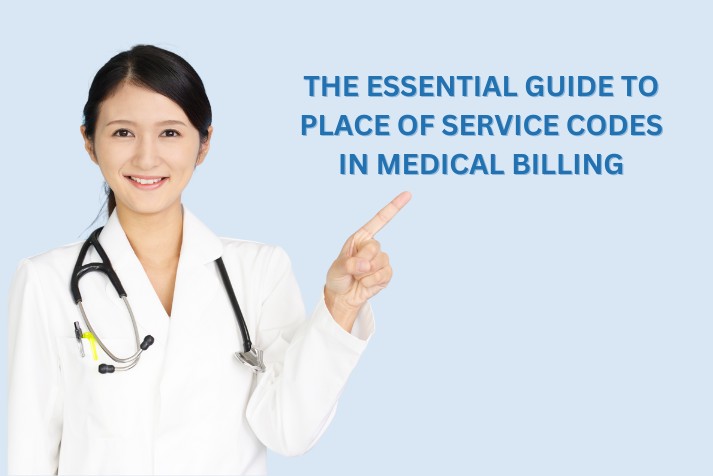Place of Service (POS) codes play a crucial role in healthcare billing since they provide important information about the environment in which medical services are provided. These codes guarantee accuracy in insurance claims while also streamlining the billing procedure. In addition to their importance, POS codes directly impact payment rates, which is why billing specialists and healthcare professionals depend on them.
Beyond financial implications, POS codes have a big impact on patient care and policy compliance in the healthcare industry. When these codes are used properly, patients receive accurate billing for treatments provided in various places, including telemedicine and hospitals. This accuracy promotes a clear invoicing procedure, which raises patient satisfaction and trust. Additionally, abiding by POS codes ensures simpler operations and continuity of service by preventing expensive billing errors and denials for healthcare providers.
What Are the Place of Service Codes?
Place of Service (POS) codes serve as identifiers for the locations where healthcare services are provided, making them an essential component of medical billing. These two-digit codes are crucial to the billing process because they inform payers where a patient received care in a hospital, doctor’s office, telehealth session, or other healthcare environment.
Role in medical billing
The role of POS codes in medical billing cannot be overstated. They set the rates at which services provided in a variety of settings, including clinics, hospitals, and telehealth, are reimbursed. These identifiers, in particular for Medicare place of service codes, facilitate the submission of claims and guarantee that providers are fairly and effectively rewarded for their services. Hence, POS knowledge is essential for medical billing since it promotes financial stability for medical practices, lowers billing errors, and helps ensure compliance.
Understanding Place of Service Codes
Understanding the place of service codes is essential for precise invoicing and compensation. These codes assist Medicare and other insurers in figuring out how much to compensate for the services provided, as well as making sure that claims are handled according to the particular guidelines and costs that apply to each service site.
Place of service codes list for Medical Billing
A list of two-digit codes called the Place of Service (POS) codes list is used in medical invoicing to indicate the location of healthcare services provided. These codes are necessary to process insurance claims correctly, calculate payment amounts, and guarantee compliance with healthcare laws. The variety of care settings available in the healthcare system is highlighted by the fact that each code designates a distinct place, such as a hospital, doctor’s office, or telemedicine facility.
| POS CODE | Description | Importance in Medical Billing |
| 01 | Pharmacy | Directs billing for services rendered in a pharmacy setting. |
| 02 | Telehealth | Facilitates reimbursement for services delivered via telecommunication, reflecting modern healthcare delivery methods. |
| 11 | Office | Indicates services provided in a physician’s office, crucial for standard outpatient billing. |
| 20 | Urgent Care Facility | Helps differentiate billing for urgent care services, impacting reimbursement rates. |
| 21 | Inpatient Hospital | Specifies inpatient services, affecting rates and coverage. |
| 22 | Outpatient Hospital | Critical for billing hospital-based outpatient services and procedures. |
| 23 | Emergency Room | Ensures accurate billing for emergency services, affecting reimbursement urgency and rates. |
| 24 | Ambulatory Surgical Center | Identifies services in a surgical center outside a hospital setting, influencing payment structures. |
| 31 | Skilled Nursing Facility | Affects billing for services in skilled nursing facilities, impacting Medicare and Medicaid reimbursements. |
| 32 | Nursing Facility | Directs billing specifics for services provided in a nursing home, excluding skilled nursing facilities. |
| 33 | Custodial Care Facility | Indicates services provided in a non-medical, custodial setting. |
| 50 | Federally Qualified Health Center | Specifies billing for services within a federally qualified health center, affecting federal funding and reimbursement. |
| 60 | Mass Immunization Center | Used for mass immunization billing, relevant during public health initiatives. |
| 99 | Other Places of Service | General code for services not specified elsewhere, offering billing flexibility. |
Importance of POS Codes in Medical Billing Practices:
Place of Service (POS) codes are essential to medical billing since they have a direct impact on the process of reimbursement. These guidelines guarantee that medical professionals receive fair compensation for the services they provide in a variety of scenarios. POS codes help to ensure that billing procedures comply with insurance rules, such as Medicare, by identifying the service location. This helps to minimize errors, streamline the claims process, and facilitate compliance. The relevance of Medicare location of service codes in the healthcare business is highlighted by the fact that proper understanding and application of these codes are necessary for efficient medical billing operations.
POS 20 in Medical Billing
Urgent Care Facility denoted by POS code 20, is a particular type of healthcare facility that offers rapid care for non-life-threatening injuries and diseases that need quick attention. Using POS 20 is important for medical billing for several reasons:
Accurate Reimbursement: It guarantees that services provided in urgent care centers are accurately invoiced, conforming to insurers’ regulations for these types of settings, which frequently differ from those for routine outpatient treatment.
Compliance: By adhering to billing standards, using the correct POS code reduces the possibility of claim rejections or audits.
Patient billing: It clarifies the type and context of care received and impacts patients’ billing statements and out-of-pocket expenses.
| Aspects | Details |
| Reimbursement | This may be higher due to urgent care facility overheads and resources. |
| Compliance | Mandatory, accurate representation is required for audit readiness and compliance. |
| Patient Billing | Influences out-of-pocket expenses based on urgent care services. |
Place of Service Codes for Professional Claims
The professional claims process relies heavily on HCFA (Healthcare Financing Administration) place of service codes to guarantee that healthcare services are appropriately paid based on the context in which they are rendered. These codes are essential to:
Streamlining the Claims Process: HCFA POS codes allow insurers to process claims more quickly and accurately by identifying the service location.
Determining Reimbursement Levels: Proper use of POS codes is essential for optimizing income, as certain settings may be eligible for greater reimbursement rates.
Ensuring Compliance: To comply with insurance and billing requirements and prevent fines or penalties, accurate usage of HCFA POS codes is required.
Medical billing professionals need to be proficient at applying these codes to professional claims since they have a direct impact on how quickly and accurately bills are processed, how accurately reimbursements are made, and how closely regulations are followed. Any medical billing professional hoping to maintain compliance, maximize revenue, and run a seamless billing operation must understand and use HCFA place of service codes appropriately.
| HCFA POS Code | Setting | Importance |
| 11 | Office | The standard setting for outpatient services. |
| 20 | Urgent Care Facility | Specific for urgent non-emergency care. |
| 23 | Emergency Room | Critical for emergency care services. |
| 02 | Telehealth | Reflects modern healthcare delivery methods. |
This shows the significance of HCFA place of service codes in professional claims and the significance of POS 20 in urgent care billing circumstances. In the wide range of medical service scenarios, the use and understanding of these codes are crucial for billing effectiveness, compliance, and optimizing payment.
Insurance Place of Service Codes: Connecting Successful Billing with CPT Codes
The Mutually Beneficial Connection Between CPT and Place of Service Codes
Definition and Usage: Place of Service (POS) codes identify the location of the service, whereas CPT (current procedural terminology) codes describe the medical operations carried out. When taken as a whole, they give insurance companies a comprehensive picture that is essential for calculating compensation.
Insurance Interpretation: To determine if a claim is approved and how much is paid, insurers use both sets of codes to evaluate the suitability of care in the given situation.
Table: Examples of POS and CPT Code Pairing
| CPT Code | Description | POS Code | Setting |
| 99213 | Office Visit, Level 3 | 11 | Doctor’s Office |
| 90834 | Psychotherapy Session | 02 | Telehealth |
| 99283 | Emergency Department Visit | 23 | Emergency Room |
Impact on Billing: Correct CPT and POS code pairing maximizes reimbursement and lowers claim denials; this emphasizes how crucial it is to know the subtle differences between each code.
Understanding 1500 place of service codes
Understanding the 1500 Claim Form and Its POS Codes
Purpose: The standard form used by non-institutional providers to file medical claims to Medicare and other insurers is the 1500 claim form. It has sections dedicated to both POS and CPT codes, which are essential for processing claims.
POS Codes on the 1500 Form: By entering these numbers in designated fields, insurers are notified about the service configuration, which has an impact on policy compliance and reimbursement rates.
Table: Key Sections for POS Code Reporting on the 1500 Form
| Section Number | Description | Importance |
| 24B | Place of Service | Directly impacts how services are reimbursed based on setting |
| 32 | Service Facility Location | Ensures the location aligns with the POS code entered |
Tips for Accurate POS Code Reporting
Check Before Submission: To prevent common problems, double-check the POS code against the service setting.
Stay Updated: To guarantee compliance, regularly check billing policy changes and POS codes.
Consult Guidelines: If the exact POS code needs to be clarified, see the billing standards applicable to the insurer.
Medical billing procedures depend heavily on the appropriate use of CPT and POS codes on insurance claims, particularly when utilizing the 1500 claim form as a framework. These codes guarantee accurate and timely reimbursement for healthcare services, in addition to facilitating straightforward communication with insurance companies. Any healthcare provider or billing professional looking to improve revenue cycle management and streamline their billing processes must understand and effectively apply these codes.
Let’s Recap
Effective healthcare billing is based on knowing and correctly utilizing place of service (POS) codes. These codes are essential for maintaining compliance with insurance rules and policies as well as ensuring that healthcare professionals are fairly compensated for their services. Medical billing professionals need to know how to use POS codes correctly since it affects everything from patient billing to the financial stability of healthcare practices.




